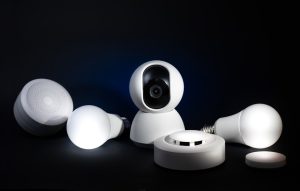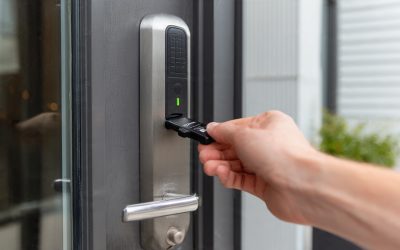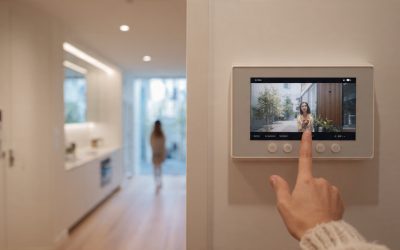Revolutionizing Living
In recent years, home automation has surged in popularity, transforming the way we interact with our living spaces. This technological revolution has been fueled by advancements in the Internet of Things (IoT), which allows various devices to communicate and work together seamlessly. As consumers become more tech-savvy and seek convenience, the demand for smart home solutions has skyrocketed.
From smart thermostats to automated lighting systems, homeowners are increasingly embracing the idea of a connected home that enhances their lifestyle. The rise of home automation can also be attributed to the growing awareness of its potential benefits. As people look for ways to simplify their daily routines, smart home technology offers a solution that not only saves time but also enhances comfort and security.
The integration of voice-activated assistants and mobile applications has made it easier than ever for homeowners to control their environments with just a few taps or voice commands. This shift towards automation is not merely a trend; it represents a fundamental change in how we perceive and interact with our homes.
Key Takeaways
- Home automation is on the rise, with more and more households adopting smart technology to improve their daily lives.
- Smart home technology offers numerous benefits, including convenience, energy savings, and increased security.
- Home automation can significantly improve energy efficiency by allowing users to monitor and control their energy usage.
- Artificial intelligence plays a crucial role in home automation, enabling devices to learn and adapt to users’ preferences and habits.
- Automation can enhance home security by providing remote monitoring, smart locks, and integrated alarm systems.
The Benefits of Smart Home Technology
Smart home technology offers a plethora of benefits that extend beyond mere convenience. One of the most significant advantages is the ability to enhance the quality of life for residents. With smart devices, homeowners can create personalized environments tailored to their preferences.
For instance, automated lighting can adjust based on the time of day or the activities taking place in a room, creating an ambiance that promotes relaxation or productivity. Additionally, smart speakers can play music or provide information on demand, making everyday tasks more enjoyable. Another key benefit of smart home technology is its potential for increased safety and security.
Homeowners can monitor their properties remotely through security cameras and smart locks, providing peace of mind whether they are at home or away. Alerts can be sent directly to smartphones in case of unusual activity, allowing for quick responses to potential threats. Furthermore, many smart home systems can integrate with emergency services, ensuring that help is just a click away in case of an emergency.
How Home Automation Can Improve Energy Efficiency

One of the most compelling reasons to invest in home automation is its ability to improve energy efficiency. Smart devices can monitor energy consumption in real-time, allowing homeowners to identify areas where they can reduce waste. For example, smart thermostats can learn a household’s schedule and adjust heating and cooling accordingly, ensuring that energy is not wasted when no one is home.
This not only leads to lower utility bills but also contributes to a more sustainable lifestyle. Moreover, automated lighting systems can be programmed to turn off when rooms are unoccupied or adjust based on natural light levels. This level of control helps minimize energy usage without sacrificing comfort.
Homeowners can also receive insights into their energy consumption patterns through mobile apps, empowering them to make informed decisions about their usage habits. By embracing home automation, individuals can significantly reduce their carbon footprint while enjoying the benefits of modern technology.
The Role of Artificial Intelligence in Home Automation
| Metrics | Data |
|---|---|
| Number of AI-powered home automation devices | Over 1 billion devices globally |
| Energy savings with AI home automation | Up to 23% reduction in energy consumption |
| Improvement in home security | AI-powered systems reduce break-ins by 30% |
| Cost savings for homeowners | Up to 1000 annually on energy bills |
Artificial intelligence (AI) plays a pivotal role in the evolution of home automation, enabling devices to learn from user behavior and adapt accordingly. AI algorithms analyze data collected from various sensors and devices, allowing for predictive capabilities that enhance the overall user experience. For instance, smart thermostats equipped with AI can anticipate temperature preferences based on historical data and adjust settings automatically, ensuring optimal comfort without manual intervention.
Furthermore, AI-driven home automation systems can facilitate seamless integration between different devices, creating a cohesive ecosystem that responds intelligently to user commands. Voice-activated assistants powered by AI can understand natural language queries and execute complex tasks, such as adjusting multiple devices simultaneously or providing updates on household status. As AI technology continues to advance, we can expect even more sophisticated automation solutions that cater to individual needs and preferences.
Enhancing Home Security with Automation
Home security is a paramount concern for many homeowners, and automation offers innovative solutions to address this issue effectively. Smart security systems provide comprehensive coverage through interconnected devices such as cameras, motion detectors, and doorbell cameras. These systems allow homeowners to monitor their properties in real-time from anywhere in the world via mobile apps, providing an added layer of security and peace of mind.
Moreover, automated security features can deter potential intruders by simulating occupancy when residents are away. For example, smart lighting systems can be programmed to turn on and off at specific intervals, creating the illusion that someone is home. Additionally, smart locks enable homeowners to grant temporary access to guests or service providers without needing physical keys, further enhancing security measures.
With these advanced technologies at their disposal, homeowners can take proactive steps to protect their properties and loved ones.
The Future of Home Automation

Enhanced Integration and Functionality
Innovations such as 5G connectivity will enable faster communication between devices, resulting in more responsive and reliable automation systems.
Sustainability and Energy Efficiency
As consumer preferences shift towards sustainability and energy efficiency, manufacturers will likely focus on developing eco-friendly smart home solutions. This could include energy-efficient appliances that communicate with one another to optimize performance or renewable energy systems that integrate seamlessly with home automation platforms.
A Brighter Future for Homeowners
The future holds exciting possibilities for homeowners who seek not only convenience but also a commitment to environmental responsibility.
Overcoming Challenges in Implementing Home Automation
While the benefits of home automation are clear, there are challenges that homeowners may face when implementing these systems. One significant hurdle is the initial cost associated with purchasing and installing smart devices. Although prices have decreased over time, a comprehensive automation system can still represent a substantial investment.
Homeowners must weigh the long-term savings against upfront costs when considering such upgrades. Another challenge lies in ensuring compatibility between different devices and platforms. With numerous manufacturers producing smart home products, not all devices may work seamlessly together.
Homeowners may need to conduct thorough research to select compatible systems or invest in hubs that facilitate communication between disparate devices. Additionally, concerns about data privacy and security must be addressed as more devices collect personal information. Homeowners should prioritize reputable brands that prioritize user privacy and offer robust security features.
Choosing the Right Home Automation System for Your Needs
Selecting the right home automation system requires careful consideration of individual needs and preferences. Homeowners should begin by assessing their specific goals for automation—whether it’s enhancing convenience, improving energy efficiency, or bolstering security. Understanding these priorities will help narrow down options and identify systems that align with desired outcomes.
It’s also essential to consider scalability when choosing a home automation system. Many homeowners start with a few key devices and expand their systems over time as needs evolve. Opting for a platform that allows for easy integration of additional devices will ensure that your system remains adaptable as technology advances.
Embracing home automation as part of your renovation journey not only enhances your living experience but also adds value to your property in an increasingly tech-driven world.
Get In Touch
FAQs
What is home automation?
Home automation refers to the use of technology to control and automate household systems and appliances, such as lighting, heating, air conditioning, security cameras, and entertainment systems.
How does home automation work?
Home automation systems typically use a combination of hardware, software, and communication protocols to enable remote monitoring and control of devices within the home. This can be done through a central control unit or via a smartphone or computer.
What are the benefits of home automation?
Some of the benefits of home automation include increased convenience, energy efficiency, improved security, and the ability to customize and personalize the home environment to suit individual preferences.
What are some common home automation devices?
Common home automation devices include smart thermostats, smart lighting systems, smart locks, security cameras, smart speakers, and smart appliances such as refrigerators and ovens.
Is home automation secure?
Home automation systems can be secure if proper measures are taken, such as using strong passwords, keeping software up to date, and using encryption for communication between devices. It is important to choose reputable and secure products and to follow best practices for securing home networks.
What are some popular home automation platforms?
Popular home automation platforms include Amazon Alexa, Google Assistant, Apple HomeKit, and Samsung SmartThings. These platforms often support a wide range of compatible devices and allow for centralized control and automation.










